Peaches are small fuzzy fruit that has a sweet and fresh taste. They’re related to plums and apricots, and they contain a large seed inside them.
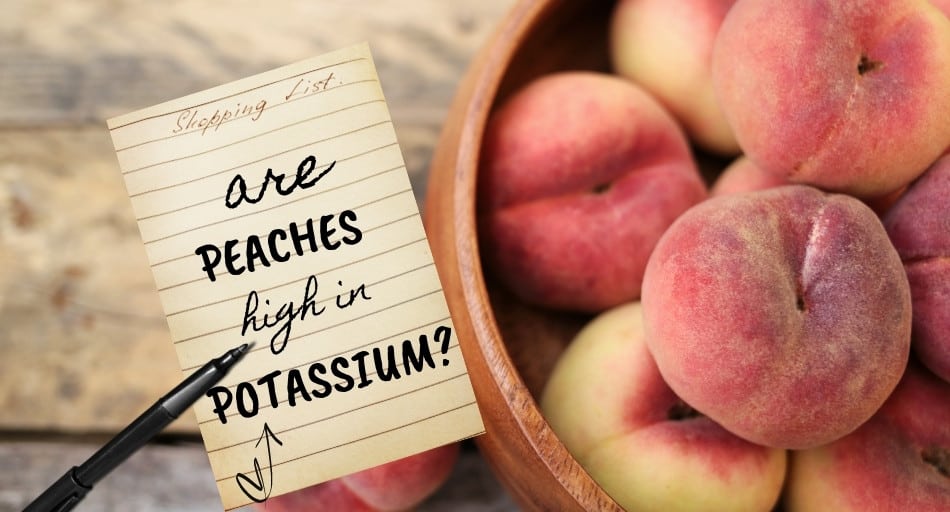
Peaches are often eaten alone as a snack, but many people use them for cooking to make pieces and other dishes.
They also contain a wide variety of vitamins and minerals, including potassium. If you suffer from kidney issues, you know that you should control how much of this mineral you take in.
So, are peaches high in potassium? Should you be eating them on a low-potassium diet?
Table of Contents
Are peaches high in potassium?
Peaches provide you with a rather large dose of potassium. As a result, those with kidney issues should be careful with consuming too many peaches, especially in one sitting. On the bright side, peaches are loaded with important nutrients that help you stay healthy.
They also contain a lot of plant compounds that fight off diseases and infections, making them a great addition to your diet.
Make sure to check out Low Phosphorus and Potassium Foods (20 Foods to Add to Your Diet) and The Best Low Potassium Snacks (Eat This, Not That).
How much potassium is in peaches?
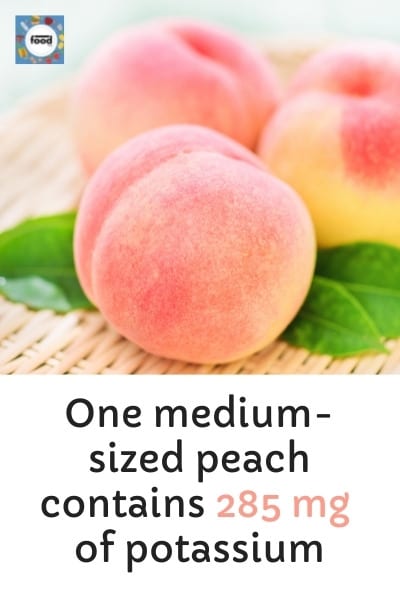
One medium-sized peach contains 285 mg of potassium. For a food to be considered low-potassium, it has to contain less than 200 mg of this mineral in a single serving.
This makes peaches a bad food for a low-potassium diet.
To avoid taking in too much potassium from peaches, you can eat smaller portions or, if you’re following an especially strict diet, completely eliminate this fruit from your diet and replace it with a low-potassium fruit alternative.
Are peaches healthy?
Most calories in peaches come from carbohydrates, including fiber. Peaches contain both types of fiber, insoluble and soluble.
Insoluble fiber helps move food through your digestive tract, while soluble fiber feeds the ‘good’ gut bacteria in your stomach.
These bacteria are responsible for reducing digestive tract inflammation and keeping your intestines healthy. It’s important to get both types of fiber from your diet, and peaches can help you do that.
Some studies also indicate that eating peaches may help alleviate allergy symptoms. The plant compounds in peaches prevent the release of histamines in your blood, reducing symptoms like sneezing, coughing, and itching.
Peach extracts also lower inflammation, which is commonly associated with an allergic reaction.
While more studies need to be conducted, these benefits are pretty impressive and can help a lot of people.
Peaches are also loaded with powerful antioxidants. These compounds help fight against oxidative stress and damage to your cells and tissues, lowering your risk of various chronic conditions, including cancer.
The antioxidants in peaches, especially those found in their skins, help lower your risk of heart disease and high blood pressure.
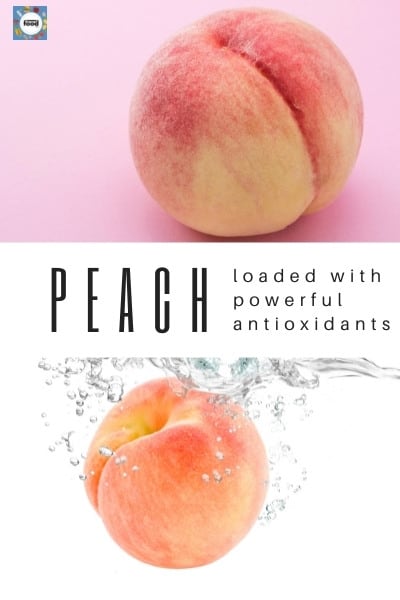
This also reduces your chances of heart attacks and strokes in people prone to these conditions.
Eating peaches may also help protect your skin and keep it healthy. The special compounds found in peaches keep your skin moisturized, which improves skin texture.
Other compounds and antioxidants help protect your skin from the damage caused by UV light as well as delay the development of skin tumors.
You will get the most out of this benefit by consuming peach extracts, but regularly eating peaches can be a great idea for your health.
Just like other fresh fruits, peaches may reduce your blood sugar levels, lower your risk of obesity, and help with weight loss.
They also contain compounds that help fight certain types of bacteria, which, in turn, boost your immune system.
Keeping your immune system healthy is very important, especially during flu seasons and colder months when your immunity is compromised.
Can you take in too much potassium from peaches?
Peaches are a relatively high-potassium fruit. Because of that, people who are particularly sensitive to this mineral or those who suffer from kidney issues should limit how many peaches they consume.
This is because consuming too many high-potassium foods can lead to kidney stones and trouble with urinating in those with kidney disease.
Most people should be OK with consuming peaches without worrying about their potassium content.
One medium peach contains just 8% of your daily recommended need for this mineral, so it’s not nearly enough to cause issues.
So, only those with certain conditions or those whose doctor advised them to follow a low-potassium diet should be careful with peaches.
Are canned peaches high in potassium?
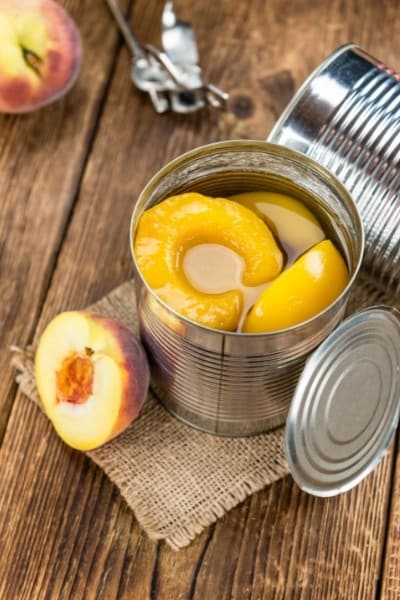
A half-cup serving of canned peaches contains 122 mg of potassium. This puts them under the limit for potassium, so it’s safe to consume them on a low-potassium diet.
But most of the calories in canned peaches come from sugar, which increases your risk of weight gain and high blood sugar levels.
Because of that, make sure to limit your consumption of canned peaches, especially those packed with heavy syrup.
Are dried peaches high in potassium?
A 3-ounce serving of dried peaches provides you with 269 mg of potassium. Just like other dried fruits, dried peaches are high in potassium, so they may not be the best food for a kidney-friendly, low-potassium diet.
You can try eating smaller portions of dried peaches, though, as they’re still delicious and make for a better snack than potato chips or ice cream and other high-fat snack options.
Is peach nectar high in potassium?
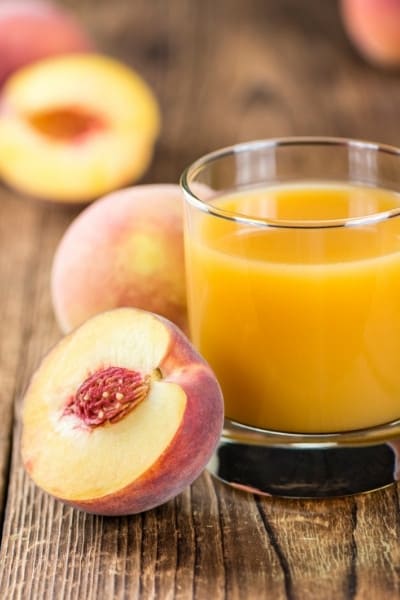
One cup of peach nectar contains around 99.6 mg of potassium. Just like canned peaches, it’s very high in sugar, so you should limit how much of it you drink or dilute it with water.
On the bright side, peach nectar contains a good dose of vitamin C and copper, which are two very important minerals.
Vitamin C helps boost your immune system and keep your skin healthy, while copper helps create red blood cells and maintain healthy bones, blood vessels, nerves, and immune function.
Conclusion
A single peach contains quite a lot of potassium. So, if you follow a low-potassium diet, make sure to consume this fruit in small amounts and not too often.
For other people, peaches are very nutritious, high in several important vitamins, and rich in antioxidants.
As a result, if your diet allows it, it’s a good idea to eat peaches.
Don't know which foods are high in potassium? Read our article, 15 Best Food Sources of Potassium. We also have a guide to this important mineral: Potassium 101: All You Need To Know About Potassium.
